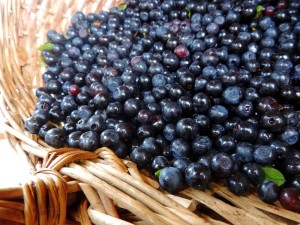Written by Patrick B. Massey, MD, PH.D. Fight the flu this winter season with Dr. Massey’s recommended arsenal of natural remedies for seasonal flu protection such as herbs, Bifidobacterum probiotics, and cranberries and elderberries that are rich in polyphenols.
 A question I am often asked in winter is “should I get the flu shot?” My answer varies. Some people need all the protection they can get and others not as much.
A question I am often asked in winter is “should I get the flu shot?” My answer varies. Some people need all the protection they can get and others not as much.
Truth be told, it is rare that the flu shot actually prevents the flu. Fortunately nature has provided some natural options to the flu vaccine. There is reasonable medical research that some foods, herbs and supplements may be effective in the prevention and treatment of influenza.
Glycyrrhiza lepidota is the name for the American licorice plant. The active ingredient is a group of compounds termed glycyrrhric acids. Licorice stimulates the production of anti-viral compounds called interferons. It also has anti-inflammatory properties so the symptoms of the flu may be blunted. The most interesting aspect of licorice root (at least to me) is that it actually prevents the influenza virus from getting into the cell, reducing the risk of the cell actually becoming infected. Overall licorice root is safe, however the glycyrrhric acids may cause high blood pressure.
Ginseng is an herb that is often used in Oriental medicine. Ginseng is classified as either red or white. Heat white ginseng and it becomes red ginseng. A number of medical studies have shown that red Korean ginseng helps to significantly reduce the symptoms and duration of upper respiratory tract infections. Although not shown specifically to reduce the incidence of influenza, it is historically used during influenza season to maintain health. Red ginseng can cause an increase in blood pressure in those with high blood pressure. Insomnia can be an issue as well as migraines in those who are sensitive to the effects of red ginseng.
All berries contain polyphenolic compounds. In some studies they are directly toxic to the influenza virus. In other studies they prevent the binding of the influenza virus to the cell. Two common berries for which there is reasonable medical research for the prevention of influenza are cranberries and elderberry. There does not seem to be any contraindications for either elderberry or cranberry.
Echinacea is a flower found throughout northern Illinois and Wisconsin often used to enhance the immune system. One study in Czechoslovakia found that drinking Echinacea tea was as effective as antiviral medications in treating the symptoms and duration of the flu, as well as preventing complications associated influenza. A concern is that Echinacea is a member of the ragweed family. If you are allergic to ragweed, there is a reasonable chance that you will be allergic to Echinacea.
There is very good research to indicate that the type of bacteria in your bowel has an important role in preventing the flu. One specific bacterium Bifidobacterium seems to produce a number of compounds that directly interfere with the ability of the influenza virus to infect a cell. Bifidobacterium reduces the symptoms of the flu and medical studies have also shown a significant reduction in mortality and viral titers.
My recommendation is to start taking Bifidobacterium probiotics before the flu season starts and take it throughout the flu season.
- Patrick B. Massey, MD, PH.D., is medical director for complementary and alternative medicine at Alexian Brothers Hospital Network and president of ALT-MED Medical and Physical Therapy, 1544 Nerge Road, Elk Grove Village. His website is www.alt-med.org
Posted February 6, 2017.
